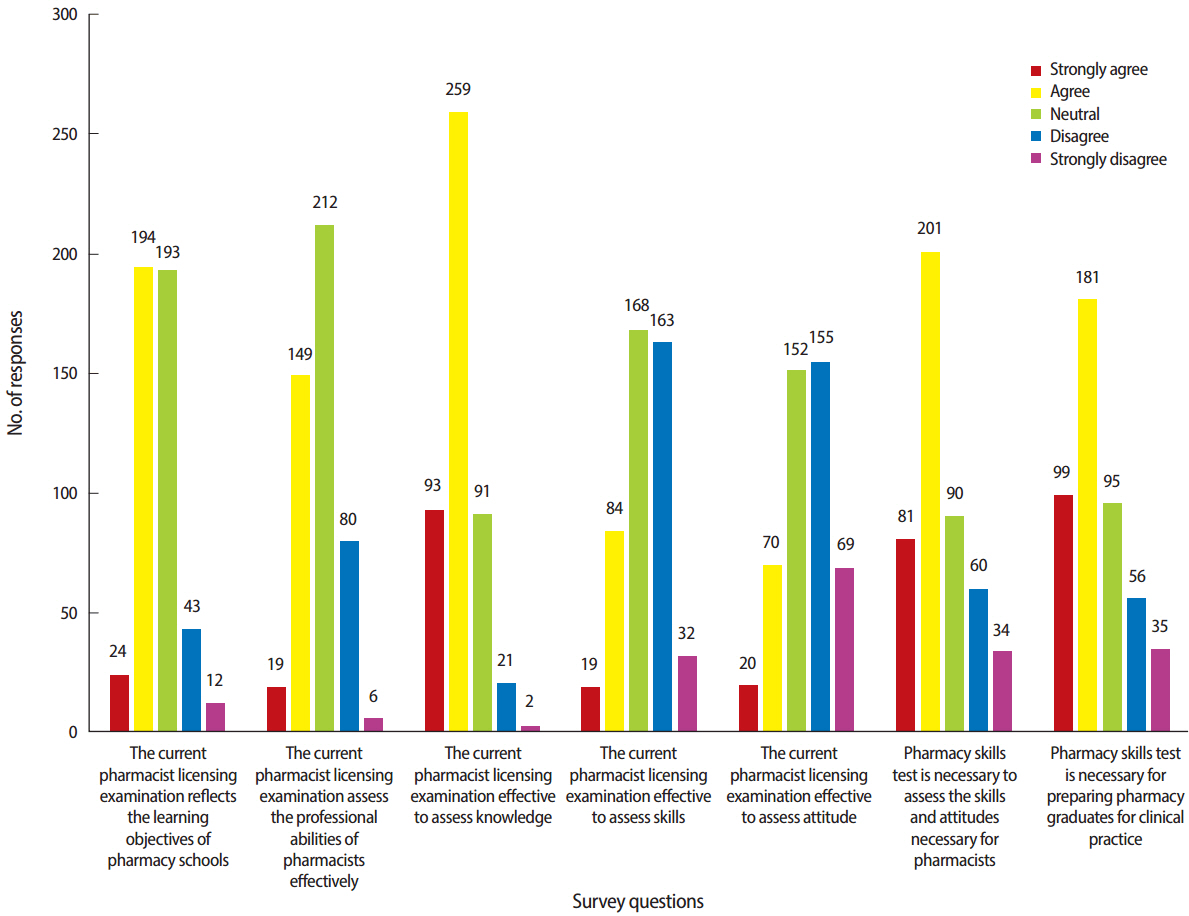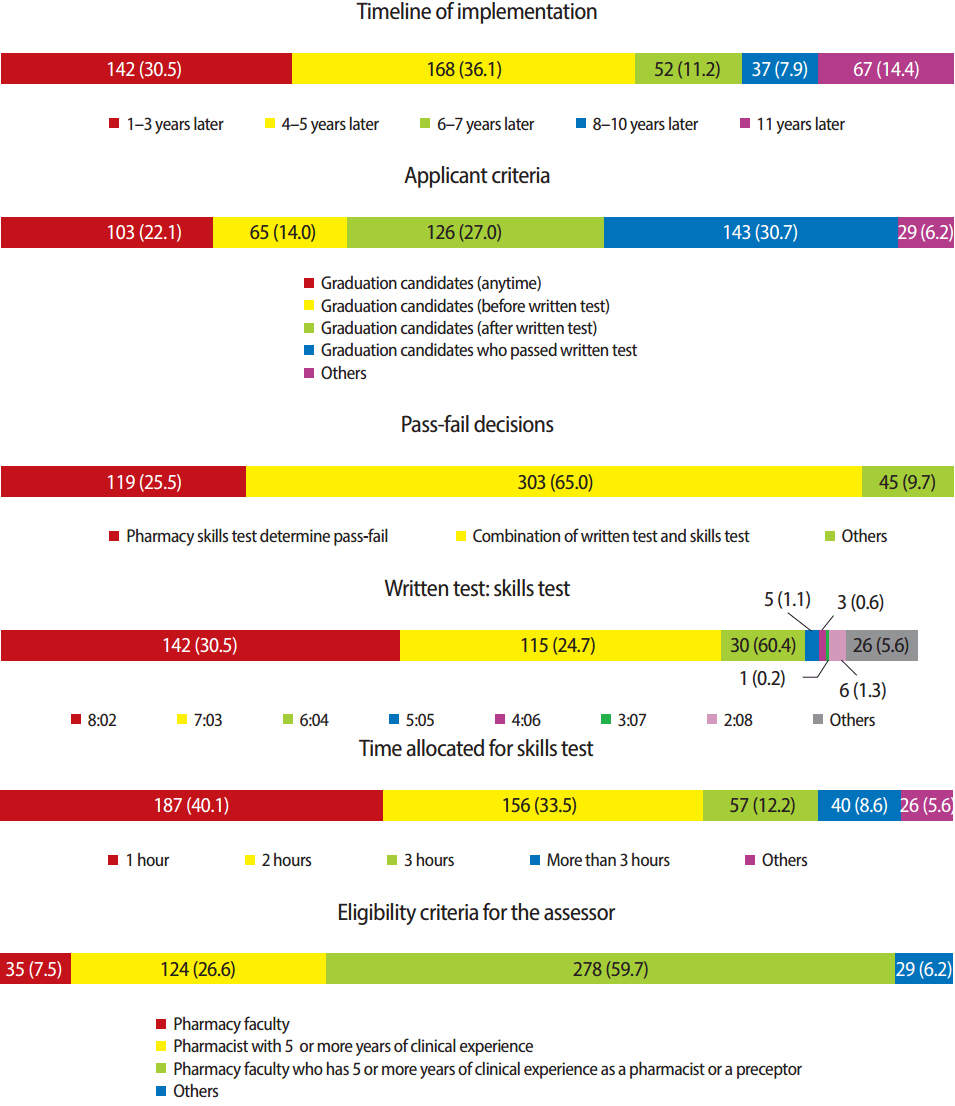J Educ Eval Health Prof.
2017;14:6. 10.3352/jeehp.2017.14.6.
Attitudes to proposed assessment of pharmacy skills in Korean pharmacist licensure examination
- Affiliations
-
- 1College of Pharmacy & Institute of Pharmaceutical Science and Technology, Ajou University, Suwon, Korea. suklee@ajou.ac.kr
- 2College of Pharmacy & Division of Life and Pharmaceutical Sciences, Ewha Womans University, Seoul, Korea.
- 3College of Pharmacy & Institute of Pharmaceutical Science and Technology, Hanyang University, Ansan, Korea.
- 4College of Pharmacy, Keimyung University, Daegu, Korea.
- 5College of Pharmacy, Yeungnam University, Gyeongsan, Korea.
- 6College of Pharmacy, Chungnam National University, Deajeon, Korea.
- 7College of Pharmacy, Seoul National University, Seoul, Korea.
- 8Korean Pharmaceutical Information Center, Seoul, Korea.
- KMID: 2406669
- DOI: http://doi.org/10.3352/jeehp.2017.14.6
Abstract
- PURPOSE
The survey aimed to obtain opinions about a proposed implementation of pharmacy skills assessment in Korean pharmacist licensure examination (KPLE).
METHODS
A 16-question survey was distributed electronically to 2,738 people including 570 pharmacy professors of 35 pharmacy schools, 550 preceptors from 865 practice sites and 1,618 students who graduated in 2015. The survey solicited responses concerning the adequacy of the current KPLE in assessing pharmacy knowledge/skills/attitudes, deficiencies of pharmacy skills testing in assessing the professional competencies necessary for pharmacists, plans for pharmacy skills tests in the current KPLE, and subject areas of pharmacy practice.
RESULTS
A total of 466 surveys were returned. The current exam is not adequate for assessing skills and attitudes according to 42%-48% of respondents. Sixty percent felt that skills test is necessary to assess qualifications and professional competencies. Almost two-thirds of participants stated that testing should be implemented within 5 years. More than 60% agreed that candidates should be graduates and that written and skills test scores can be combined for pass-fail decisions. About 70% of respondents felt that the test should be less than 2 hours in duration. Over half of the respondents thought that the assessor should be a pharmacy faculty member with at least 5 years of clinical experience. Up to 70% stated that activities related to patient care were appropriate and practical for the scope of skills test.
CONCLUSION
Pharmacy skills assessment was supported by the majority of respondents.
MeSH Terms
Figure
Reference
-
References
1. Allemann SS, van Mil JW, Botermann L, Berger K, Griese N, Hersberger KE. Pharmaceutical care: the PCNE definition 2013. Int J Clin Pharm. 2014; 36:544–555. https://doi.org/10.1007/s11096-014-9933-x.
Article2. Thamby SA, Subramani P. Seven-star pharmacist concept of WHO. J Young Pharm. 2014; 6:1–3. https://doi.org/doi:10.5530/jyp.2014.2.1.
Article3. Korea Health Personnel Licensure Examination Institute. Examination guide [Internet]. Health Personnel Licensure Examination. Seoul: Health Personnel Licensure Examination Institute;2012. [cited 2016 Dec 23]. Available from: http://www.kuksiwon.or.kr/EngHome/context.aspx?page=sub_2_1&sub=6.4. The Pharmacy Examining Board of Canada. Pharmacist qualifying examination [Internet]. Toronto (ON): The Pharmacy Examining Board of Canada;2016. [cited 2016 Dec 23]. Available from: http://www.pebc.ca/index.php/ci_id/3147/la_id/1.htm.5. Utsumi M, Hirano S, Fujii Y, Yamamoto H. Evaluation of the pharmacy practice program in the 6-year pharmaceutical education curriculum in Japan: community pharmacy practice program. J Pharm Health Care Sci. 2015; 1:27. https://doi.org/10.1186/s40780-015-0026-3.
Article6. General Pharmaceutical Council. Registering as a pharmacist [Internet]. London: General Pharmaceutical Council;2016. [cited 2016 Dec 23]. Available from:http://www.pharmacyregulation.org/registration/registering-pharmacist/uk-recognised-pharmacist-qualifications.7. Park HK. The impact of introducing the Korean Medical Licensing Examination clinical skills assessment on medical education. J Korean Med Assoc. 2012; 55:116–123. https://doi.org/10.5124/jkma.2012.55.2.116.
Article8. Korea Health Personnel Licensure Examination Institute. Pharmacist professional job description 2nd report. Seoul: Korea Health Personnel Licensure Examination Institute;2014.9. Khan KZ, Ramachandran S, Gaunt K, Pushkar P. The objective structured clinical examination (OSCE): AMEE guide no. 81. Part I: an historical and theoretical perspective. Med Teach. 2013; 35:e1437–e1446. https://doi.org/10.3109/0142159X.2013.818634.
Article10. Austin Z, Ensom MH. Education of pharmacists in Canada. Am J Pharm Educ. 2008; 72:128. https://doi.org/10.5688/aj7206128.
Article11. Yim MK. Reforms of the Korean Medical Licensing Examination regarding item development and performance evaluation. J Educ Eval Health Prof. 2015; 12:6. https://doi.org/10.3352/jeehp.2015.12.6.
Article
- Full Text Links
- Actions
-
Cited
- CITED
-
- Close
- Share
- Similar articles
-
- Proposal of the Implementation of an International Pharmacy Graduate Preliminary Examination
- Selection of Tasks for Assessment of Pharmacy Clinical Performance in Korean Pharmacist Licensure Examination: Results of an Expert Survey
- Pharmacist Education and National License Examination System in North Korea
- Proposal of Pharmacy School Objective Structured Clinical Examination (OSCE) Contents and Test Methods
- Revised subjects of the Current Korean Oriental Pharmacists' Licensing Examination



